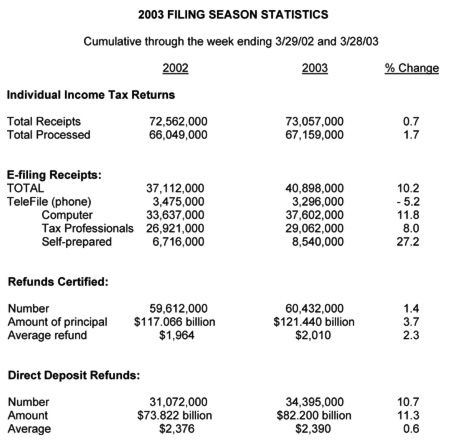|
April 02, 2003
IRS Offers Options When Tax Day Is “Pay” Day
WASHINGTON - If the tax filing deadline will be a “pay” day for you, the Internal Revenue Service offers several options to help you meet your obligation. It also has an installment program for those who cannot pay the full amount now.
If you´re sending a check or money order, make it payable to “United States Treasury” and include your social security number, a daytime phone number, the year and type of form filed -- for example, “2002 Form 1040.” Use the Form 1040-V payment voucher if you have one and do not staple the payment to the tax return. Send any 2003 estimated tax payment separately.
While e-filing your return by computer or phone, you may authorize the Treasury to electronically withdraw your tax payment from your checking or savings account on a specified date. This is similar to the electronic funds withdrawals many people have for their monthly mortgage, auto, utility or insurance payments, except this withdrawal for income tax is a one-time payment. There is no charge for this service. This scheduled payment option is available through April 15. Almost 225,000 e-filers had authorized electronic withdrawals as of March 28.
You may also authorize an electronic withdrawal when requesting an extension by phone at 1-888-796-1074 (toll-free). Use Form 4868 as a worksheet to prepare for the call, but don´t mail it to the IRS. You will also need the adjusted gross income from your 2001 tax return to authorize the withdrawal. Those not making a payment with the extension request will not need the prior year tax information. You will receive a confirmation number at the end of the call for your records. The extension request line is open 24 hours a day until the filing deadline.
You may also charge your taxes to an American Express, Discover Card, MasterCard or VISA account by calling or using the Web site of one of the two processors handling such payments. The tax instructions have details on accessing these services. Private sector companies process the credit card transactions and charge convenience fees. The IRS does not collect such fees, nor does the IRS receive or store the credit card numbers. The cardholder´s account statement will show the tax payment and the fee separately.
You may use a credit card to pay the balance due on your 2002 income tax return, to make a payment related to an automatic filing extension request, to make estimated tax payments for 2003, or to make an installment payment on taxes owed for 1999 or a later year. If you make an extension-related credit card payment – which may be done only through one of the two commercial processors – you need not file Form 4868 or call the IRS extension line.
Those who cannot pay the full tax due may qualify for an installment payment plan. The IRS offers a streamlined approval process if the amount due is not more than $25,000 and the taxpayer will pay it within a five-year period.
You may ask for an installment plan when you file by attaching Form 9465, “Installment Agreement Request,” to the front of the tax return, listing the proposed monthly payment amount and date. You may also choose to conveniently pay from your bank account each month through an electronic funds withdrawal program.
There is a $43 fee for setting up the installment agreement. Taxpayers will also pay interest -- currently figured at five percent per year, compounded daily -- plus a late payment penalty. This penalty, usually 0.5 percent of the balance due per month, drops to 0.25 percent when the IRS approves the agreement for an individual taxpayer who filed the return on time and did not receive a levy notice.
Besides possibly qualifying for this reduced late payment penalty, people who cannot pay the taxes owed have another reason to file on time -- to avoid the late filing penalty of five percent per month of the balance due. Sending as large a payment as possible with the return will lessen any interest and penalty charges.
The IRS Web site at www.irs.gov has an interactive feature to help taxpayers determine their eligibility for an installment agreement and to download related forms. Form 9465 is also available by calling (toll-free) 1-800-TAX-FORM, or from IRS TaxFax. From a fax machine, call 703-368-9694 -- not a toll-free number -- and request item #14842 by return fax.
The IRS has received more than 73 million returns and processed more than 60 million refunds, totaling more than $121 billion. At $2,010, the average refund is 2.3 percent greater than at this time last year.

Previous | Next
2003 IRS News Releases | News Releases Main | Home
| 